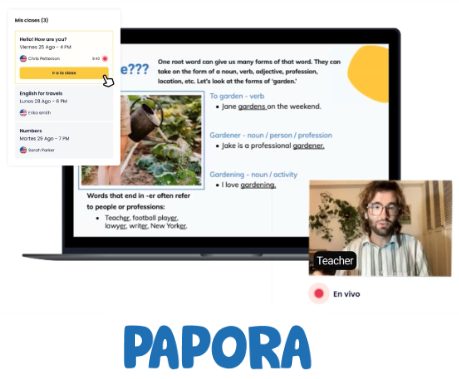Do you want to master English but don't know where to start? This English learning guide will show you the most effective path to fluency.
Learning English doesn't have to be complicated. With the right methods, proven strategies, and the right resources, you can significantly accelerate your progress.
Find expert advice, effective techniques, and a step-by-step plan designed to take you from beginner to advanced. Start your language transformation today!

Where to start learning English?
There are crucial points to consider when starting your learning. For example, what should you know and learn first? What does basic English include? Our experts at Papora answer these questions...
Whether you're looking to learn English on your own or not, you need to keep the following in mind:
1. Know your English level
☝️ English is a hugely international language, and we can find it in every part of our daily lives. Chances are you already have some knowledge of the language and just need to start the process to learn everything new.
🤔 Someone at a basic level (A1) won't learn the same things as people at an intermediate level (B1) of the language.
📈 Being able to identify your English level will help you classify the appropriate topics to advance, ensuring you're confident in what you already know.
✅ On the internet, you can find many articles that tell you what English levels are and some English level tests that will ask you the necessary questions to determine your current level.

- English Level Test A1
- English Level Test B2
Forget about boring, traditional methods!
Study English with Papora in a dynamic and comprehensive way, with certified native-level teachers.
Try a lesson

2. Work on all areas of the language
Once you know your level, it's important to focus on creating an English study plan that allows you to learn a little bit of everything.
It's important to include vocabulary, grammar, pronunciation, listening, and reading in your study sessions.
If you want to know how to learn English from scratch, it's essential to include things like the alphabet, numbers, verbs, the most important words, and the most frequently used phrases in English.
This can give you a foundation while you make time for in-depth learning.
3. Train your listening and speaking skills
Developing instinctive listening and speaking skills in English is a great advantage for mastering the language.
Think back to when you were a child and how you learned to speak and pronounce words. You did this by listening to other people do it.

To do this, you need to listen to native speakers speaking English. Choose material you feel comfortable with, that matches your level, and analyze the words. Look for words you don't understand, try to understand the context of the sentence, and use subtitles if necessary.
Finally, repeat! This will be the next step to developing your pronunciation and starting to speak English. Repeating out loud from the start will be essential to becoming more fluent over time.
4. Add vocabulary
Vocabulary is what gives content to your sentences and conversations.
Knowing how to say and spell countries, professions, animals, some adjectives, and all the other words that shape your dialogues will be crucial to becoming fluent in the language. We encourage you to make a list!
5. Don't translate into Spanish
Finally, one of the most important rules when learning a new language is not to translate what you think and want to say from Spanish into English. Every language is different, so there are Spanish words that don't make sense or don't exist in English, and vice versa.
Start thinking in English, use the new words you're learning, speak in Spanglish at first if necessary, but don't try to translate what you want to say.
“Don't translate from your own language into English. Words change from other languages into English. The richness of language comes from thinking in that language. I tell my students to take baby steps. Read, too, and look up the word only when you see it three or more times, because the repetition of the word means it's important.”
Define your goals for learning English
- What is your motivation, personal or professional?
- Do you want to learn technical or conversational English for everyday use?
- Do you have ample time to invest, or just a little time?
“When learning English, it's very important to be motivated. That's why I always recommend that students find ways to incorporate their own hobbies or favorite subjects into their studies. I believe this helps them focus and become more engaged in their English learning. Having students watch YouTube videos and listen to podcasts helps them stay fully engaged in their studies.”
Learning English for Work
If you want to learn English to get a job and be able to work in good companies, you should know that it's important to focus on learning vocabulary related to your field.
Each type of job requires a different level of English. A speaker, of course, needs a better level of expression than an accountant, although both require a conversational level of the language.
In addition, knowing English opens up communication with international clients, providing an opportunity for expansion. Therefore, learn what you need to communicate assertively, and the vocabulary and grammar to defend yourself in your niche.

Learning English for a Trip
If, on the other hand, you want to learn English because you want to travel to English-speaking countries like the United States or England and are just visiting, a basic-intermediate level of the language may be fine.
In this case, it's recommended that you develop a conversational level that you feel confident with and that you study everyday vocabulary so you can order in restaurants and have conversations in hotels or airports.
Learning English for Your Everyday Life
Now, if you want to learn it for everyday use, focus on learning a little bit of everything and reaching the level you want to achieve.
Prioritize survival vocabulary (200 essential words like directions, food, shopping) over complex grammar. Practice social emergency phrases like "Could you help me?" or "I don't understand."
Expert Tip: Spend 15 minutes a day simulating a specific real-life situation.
Instead of audiobooks, consume real-life content: YouTube, podcasts, or TV series in English.

Studying an Online English Course vs. an In-Person English Course
There are many courses with different methodologies, and two main modalities, between which students debate:
Advantages and disadvantages of face-to-face English
| Advantages | Disadvantages |
|---|---|
| Face-to-face classes with the teacher | It does not allow you to study at your own pace |
| Greater visual connection and closeness in learning | Requires travel from home or work |
| Immediate resolution of doubts during class | You depend on a fixed schedule established by the academy |
| Improve socialization thanks to group classes | Less flexibility and autonomy compared to online formats |
Advantages and disadvantages of online English
| Advantages | Disadvantages |
|---|---|
| Dynamic and practical method focused on speaking from the beginning | It requires greater motivation and personal discipline |
| Live classes with native-level teachers from anywhere | There is no imposed structure as in face-to-face academies |
| Total flexibility to learn at your own pace and on your own schedule | Progress depends entirely on the student's commitment |
| Unlimited classes per month and self-guided distance learning | Direct physical interaction with other students may be lacking |
Which is better?
Free Resources and Techniques for Learning English
With all of the above in mind, it's time to consider all the English learning tools that can help make the journey much easier:
Learn English with Books
A great technique to stimulate grammar and reading is to use books to learn English.
Although remember that these should always be adapted to your language level, and a good trick is to pair them with a dictionary and a notebook so you can write down the new words you're learning.
📌 And if books aren't your thing, you can apply this technique by reading a news blog or even a gossip site in English.
Why choose between different methods when you can have them all in Papora?
Unlimited classes, certified native teachers, a self-guided course up to C1.
Start studying

Learn English by listening to podcasts and YouTube videos
Listening to podcasts from native speakers or watching YouTube videos of English speakers is very helpful for sharpening your ear and, at the same time, allowing you to imitate the pronunciation of words, thus improving your pronunciation.
Additionally, you can sing a song, read the lyrics in Spanish and English, and sing along to learn how to say certain words.
For this trick, the best method is the repetition method; that's what will help you gradually become more fluent.
Learn English for free with games
Another great method is to learn English through play.
This is a fun and educational addition that can greatly enhance your classes, especially when combined with English learning books that encourage active participation.
You can choose options like Hangman, word searches, or games like Trivia Crack or Scrabble if you want a challenge. The important thing is to take advantage of your playful moments to practice.
📌 And if digital isn't for you, remember you can always make your own physical version to practice with your friends.

Learn English with TV shows and movies
Another way you can practice your listening and speaking skills is with movies and TV shows to learn English.
Being able to listen to these productions in their original version, with the help of subtitles, is a great advantage for learning new vocabulary and accents.

Learn English with AI
- AI assistants like ChatGPT can revolutionize your English learning.
- Ask it to act as your native speaker and correct your mistakes. This will allow you to simulate real conversations without the pressure of perfection.
- Try combining it with AI-powered English learning platforms that help you practice vocabulary, listening, and grammar in a more interactive way.
- You can also ask it to explain expressions you hear in TV shows or generate specific dialogues for situations you need to practice.
How long does it take to learn English?
- If you're just looking for basic English, you can even learn English in 3 months, but what you can learn in such a short time will only be useful for brief and simple situations.
- If you really want to focus on reaching an intermediate-advanced level of the language, you should keep in mind that it takes time and consistent discipline in your classes with native speakers.
- If you study at least 4 hours a week and put in consistent dedication, you could learn an upper-intermediate level in about 5 years.
How to organize your time to learn English?
💡 Create study sessions that you feel comfortable with and where you can have fun and learn with different resources.
💡 Create fixed schedules and commit to sticking to them.
💡 Allow time to practice a little of each area during the week, and set aside another day where you can practice listening, writing, and speaking at the same time.
💡 Respect your own classes and your own rules. Studying English goes beyond what you see in a lesson.
“You need to schedule a couple of hours of extra study time on your own; again, you should get a weekly planner and plan specific times when you intend to study and stick to them. The more you try to do this, the more disciplined you'll become. You can listen to podcasts while you're doing other things to increase your language learning time. When you're cleaning, taking a walk, or just relaxing. Listen to English podcasts and try to get used to the sound of the language, the pronunciation, and the different accents.”
The most comprehensive option: Papora
Learning English with the Papora method allows you to study as if it were a game, with dynamic exercises that teach you vocabulary, grammar, listening, pronunciation, and reading at the same time. Best of all, they're done with real-life examples.
Papora offers you what no other school can offer: the opportunity to study with unlimited live classes with native-level teachers and a self-guided course with over 300 lessons—everything you need to become an expert.
Turn these tips into real fluency with Papora
At Papora, you don't just learn the most effective techniques, you also live them in every lesson.
Speed up your English process

Frequently Asked Questions About English Learning Guides
Learning dynamically and through example is one of the best techniques when studying English, as it allows for constant practice and exposure to real-life situations. Courses like Papora take these foundations into account to turn their students into experts, thanks to live classes.
A traditional English course can last up to 5 years or more, but when it comes to online English courses like Papora, one of the best advantages is that you set your own pace and can make it last as long as you need.






